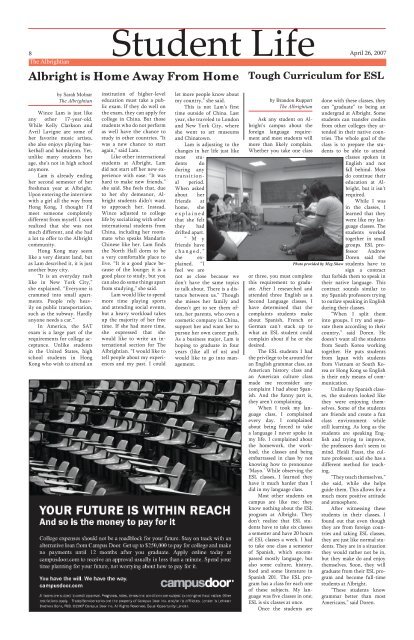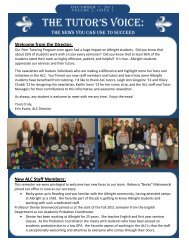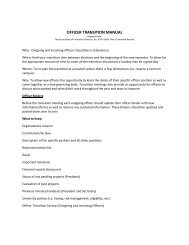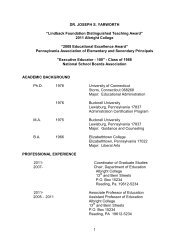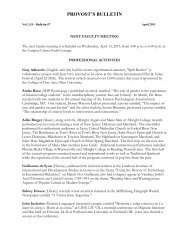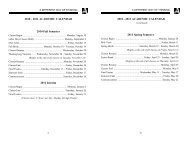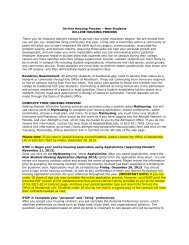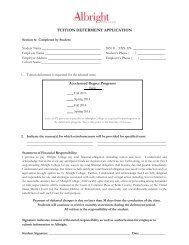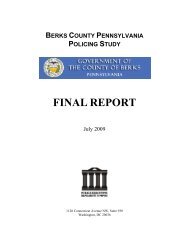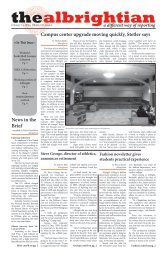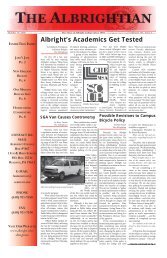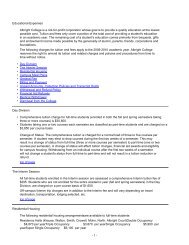4/26/2007 - Albright College
4/26/2007 - Albright College
4/26/2007 - Albright College
You also want an ePaper? Increase the reach of your titles
YUMPU automatically turns print PDFs into web optimized ePapers that Google loves.
The <strong>Albright</strong>ian<br />
Student Life<br />
<strong>Albright</strong> is Home Away From Home<br />
April <strong>26</strong>, <strong>2007</strong><br />
Tough Curriculum for ESL<br />
by Sarah Molnar<br />
The <strong>Albright</strong>ian<br />
Wince Lam is just like<br />
any other 17-year-old.<br />
While Kelly Clarkson and<br />
Avril Lavigne are some of<br />
her favorite music artists,<br />
she also enjoys playing basketball<br />
and badminton. Yet,<br />
unlike many students her<br />
age, she’s not in high school<br />
anymore.<br />
Lam is already ending<br />
her second semester of her<br />
freshman year at <strong>Albright</strong>.<br />
Upon entering the interview<br />
with a girl all the way from<br />
Hong Kong, I thought I’d<br />
meet someone completely<br />
different from myself. I soon<br />
realized that she was not<br />
much different, and she had<br />
a lot to offer to the <strong>Albright</strong><br />
community.<br />
Hong Kong may seem<br />
like a very distant land, but<br />
as Lam described it, it is just<br />
another busy city.<br />
“It is an everyday rush<br />
like in New York City,”<br />
she explained. “Everyone is<br />
crammed into small apartments.<br />
People rely heavily<br />
on public transportation,<br />
such as the subway. Hardly<br />
anyone needs a car.”<br />
In America, the SAT<br />
exam is a large part of the<br />
requirements for college acceptance.<br />
Unlike students<br />
in the United States, high<br />
school students in Hong<br />
Kong who wish to attend an<br />
institution of higher-level<br />
education must take a public<br />
exam. If they do well on<br />
the exam, they can apply for<br />
college in China. But those<br />
students who do not perform<br />
as well have the chance to<br />
study in other countries. “It<br />
was a new chance to start<br />
again,” said Lam.<br />
Like other international<br />
students at <strong>Albright</strong>, Lam<br />
did not start off her new experience<br />
with ease. “It was<br />
hard to make new friends,”<br />
she said. She feels that, due<br />
to her shy demeanor, <strong>Albright</strong><br />
students didn’t want<br />
to approach her. Instead,<br />
Wince adjusted to college<br />
life by socializing with other<br />
international students from<br />
China, including her roommate<br />
who speaks Mandarin<br />
Chinese like her. Lam finds<br />
the North Hall dorm to be<br />
a very comfortable place to<br />
live. “It is a good place because<br />
of the lounge; it is a<br />
good place to study, but you<br />
can also do some things apart<br />
from studying,” she said.<br />
Lam would like to spend<br />
more time playing sports<br />
and attending social events,<br />
but a heavy workload takes<br />
up the majority of her free<br />
time. If she had more time,<br />
she expressed that she<br />
would like to write an international<br />
section for The<br />
<strong>Albright</strong>ian. “I would like to<br />
tell people about my experiences<br />
and my past. I could<br />
let more people know about<br />
my country,” she said.<br />
This is not Lam’s first<br />
time outside of China. Last<br />
year, she traveled to London<br />
and New York City, where<br />
she went to art museums<br />
and Chinatown.<br />
Lam is adjusting to the<br />
changes in her life just like<br />
most students<br />
do<br />
during any<br />
transitional<br />
period.<br />
When asked<br />
about her<br />
friends at<br />
home, she<br />
e x p l a i n e d<br />
that she felt<br />
they had<br />
drifted apart.<br />
“ M y<br />
friends have<br />
c h a n g e d , ”<br />
she explained.<br />
“I<br />
feel we are<br />
not as close because we<br />
don’t have the same topics<br />
to talk about. There is a distance<br />
between us.” Though<br />
she misses her family and<br />
doesn’t get to see them often,<br />
her parents, who own a<br />
cosmetic company in China,<br />
support her and want her to<br />
pursue her own career path.<br />
As a business major, Lam is<br />
hoping to graduate in four<br />
years (like all of us) and<br />
would like to go into management.<br />
by Brandon Ruppert<br />
The <strong>Albright</strong>ian<br />
Ask any student on <strong>Albright</strong>’s<br />
campus about the<br />
foreign language requirement<br />
and most students will<br />
more than likely complain.<br />
Whether you take one class<br />
or three, you must complete<br />
this requirement to graduate.<br />
After I researched and<br />
attended three English as a<br />
Second Language classes, I<br />
have determined that the<br />
complaints students make<br />
about Spanish, French or<br />
German can’t stack up to<br />
what an ESL student could<br />
complain about if he or she<br />
desired.<br />
The ESL students I had<br />
the privilege to be around for<br />
an English grammar class, an<br />
American history class and<br />
an American culture class<br />
made me reconsider any<br />
complaint I had about Spanish.<br />
And the funny part is,<br />
they aren’t complaining.<br />
When I took my language<br />
class, I complained<br />
every day. I complained<br />
about being forced to take<br />
a language I never spoke in<br />
my life. I complained about<br />
the homework, the workload,<br />
the classes and being<br />
embarrassed in class by not<br />
knowing how to pronounce<br />
‘Mayo.’ While observing the<br />
ESL classes, I learned they<br />
have it much harder than I<br />
did in my language class.<br />
Most other students on<br />
campus are like me; they<br />
know nothing about the ESL<br />
program at <strong>Albright</strong>. They<br />
don’t realize that ESL students<br />
have to take six classes<br />
a semester and have 20 hours<br />
of ESL classes a week. I had<br />
to take one class a semester<br />
of Spanish, which encompassed<br />
mostly language, but<br />
also some culture, history,<br />
food and some literature in<br />
Spanish 201. The ESL program<br />
has a class for each one<br />
of these subjects. My language<br />
was five classes in one;<br />
ESL is six classes at once.<br />
Once the students are<br />
Photo provided by Meg Shaw<br />
done with these classes, they<br />
can “graduate” to being an<br />
undergrad at <strong>Albright</strong>. Some<br />
students can transfer credits<br />
from other colleges they attended<br />
in their native countries.<br />
The whole goal of the<br />
class is to prepare the students<br />
to be able to attend<br />
classes spoken in<br />
English and not<br />
fall behind. Most<br />
do continue their<br />
education at <strong>Albright</strong>,<br />
but it isn’t<br />
required.<br />
While I was<br />
in the classes, I<br />
learned that they<br />
were like my language<br />
classes. The<br />
students worked<br />
together in small<br />
groups. ESL professor<br />
Andrew<br />
Doren said the<br />
students have to<br />
sign a contract<br />
that forbids them to speak in<br />
their native language. This<br />
contract sounds similar to<br />
my Spanish professors trying<br />
to outlaw speaking in English<br />
during their classes.<br />
“When I split them<br />
into groups, I try and separate<br />
them according to their<br />
country,” said Doren. He<br />
doesn’t want all the students<br />
from South Korea working<br />
together. He puts students<br />
from Japan with students<br />
from Vietnam or South Korea<br />
or Hong Kong so English<br />
is their only means of communication.<br />
Unlike my Spanish classes,<br />
the students looked like<br />
they were enjoying themselves.<br />
Some of the students<br />
are friends and create a fun<br />
class environment while<br />
still learning. As long as the<br />
students are speaking English<br />
and trying to improve,<br />
the professors don’t seem to<br />
mind. Heidi Faust, the culture<br />
professor, said she has a<br />
different method for teaching.<br />
“They teach themselves,”<br />
she said, while she helps<br />
guide them. This allows for a<br />
much more positive attitude<br />
and atmosphere.<br />
After witnessing these<br />
students in their classes, I<br />
found out that even though<br />
they are from foreign countries<br />
and taking ESL classes,<br />
they are just like normal students.<br />
They are in a situation<br />
they would rather not be in,<br />
but they make do and enjoy<br />
themselves. Soon, they will<br />
graduate from their ESL program<br />
and become full-time<br />
students at <strong>Albright</strong>.<br />
“These students know<br />
grammar better than most<br />
Americans,” said Doren.


